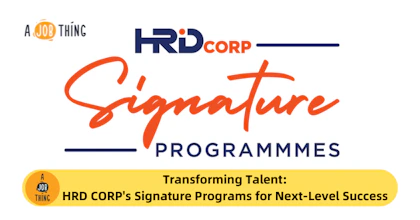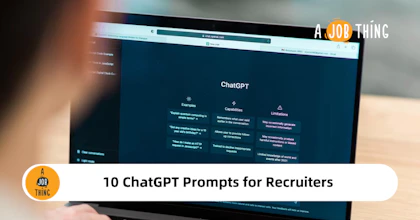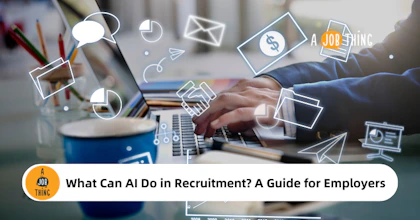Products
AI JOB AD
Create compelling job ads in seconds with AI-powered assistance.
AI JOB FOLDER
Automate your candidate screening and folder management.

CAREER PAGE
Build your personalized career page with strong company branding to attract candidates and manage your job vacancy.

AJOBTHING REVIEW
Explore what employers love about AJobThing recruitment platform for fast & successful hiring
AJOBTHING CARE
Get dedicated after-sales support, hiring guidance, and personalized assistance to ensure your recruitment success.
PARTNERSHIP
Collaborate with us to achieve mutual success and reach a wider audience.
Resources
Products
AI JOB AD
Create compelling job ads in seconds with AI-powered assistance.
AI JOB FOLDER
Automate your candidate screening and folder management.

CAREER PAGE
Build your personalized career page with strong company branding to attract candidates and manage your job vacancy.

AJOBTHING REVIEW
Explore what employers love about AJobThing recruitment platform for fast & successful hiring
AJOBTHING CARE
Get dedicated after-sales support, hiring guidance, and personalized assistance to ensure your recruitment success.
PARTNERSHIP
Collaborate with us to achieve mutual success and reach a wider audience.
- Select your industry

Pre-Employment Background Checks: Guide for HR & Employer
Before offering a position to a candidate, employers typically conduct pre-employment background checks with the candidate’s consent. The purpose is to verify the candidate’s skills, work history, and achievements so they have the qualifications needed to contribute effectively to the company. Additionally, these checks help confirm the candidate’s character and that they have no criminal history.
In this article, we’ll cover the essentials of pre-employment background checks and how to conduct them. Read on for a detailed explanation.
What is a pre-employment background check?
A pre-employment background check is a screening process used by employers to verify a candidate’s identity, qualifications, and employment history. It is not just a simple resume review, but it also involves verifying references, checking for past criminal activity, confirming educational achievements, and sometimes even reviewing social media presence. Each background check is executed based on the position and industry standards.
The primary purpose of a background check is to confirm a candidate’s qualifications, skills, and certifications. While resumes highlight achievements, verification with previous employers and educational institutions ensures accuracy and honesty, helping employers avoid hiring individuals who may be less transparent about their history.
Background checks also provide insight into a candidate’s character and cultural fit. By reaching out to references or, in some cases, reviewing social media, employers can better understand the candidate’s values and behavior especially valuable for roles requiring trust or customer interaction.
Safety is another key reason. For roles involving financial access or sensitive information, criminal checks help identify any security risks, safeguarding the workplace.
Why are pre-employment background checks important?
Background checks serve as a critical step to verify that a candidate is the right fit for the role and the organization. Here are several key reasons why they are important:
Importance for verifying qualifications, skills, and work experience
As mentioned above, candidates might show outstanding skills, roles, education, and achievements in their resumes. We need to make sure that these are the full truth. This is to ensure the candidates genuinely possess the qualifications needed for the role give their best contribution to the role and maintain quality and compliance.
Reducing the risk of hiring unqualified or dishonest employees
By doing background checks, employers can reduce the risk of hiring unqualified employees because by contacting the candidate’s references, employers can verify the role and achievements of the candidates. If it is not aligned, then the employers can disqualify the candidates.
Enhancing workplace safety and security
For roles involving access to sensitive information, handling of valuable assets, or interaction with vulnerable individuals, knowing a candidate’s criminal history is essential. Criminal background checks help protect other employees, clients, and the company by identifying any red flags that may indicate a security or safety risk.
Legal liabilities and compliance in Malaysia
Bad hiring decisions can have serious consequences. For example, hiring someone with a history of financial mismanagement for a finance role could lead to internal fraud or liability. By conducting thorough background checks, employers can minimize the risks of hiring individuals who may cause financial or reputational harm.
Types of Background Checks in Malaysia
There are various types of background checks that most employers do. You may combine more than one background check, as long as it answers your concern and gives much information needed.
Criminal background checks
A criminal background check is often crucial for roles where safety, trust, or public interaction is involved. Employers, particularly in sectors like finance, education, healthcare, or security, need to ensure candidates have a clean record.
In Malaysia, this check is commonly conducted through third-party screening agencies that collaborate with the Royal Malaysia Police (Polis Diraja Malaysia) to access criminal records. Although not directly accessible by employers, agencies can provide insight into any legal issues or past offenses that may be relevant, helping employers make informed decisions.
Employment verification
This type of background check goal is to confirm that a candidate’s professional experience matches what they have claimed. Employers reach out to the candidate’s previous employers to confirm:
- job titles
- how long they worked
- their responsibilities
- reasons for leaving
- salary
- job performance
Sometimes, the verification also includes a performance assessment or feedback on work ethics. This check reassures employers that the candidate has the necessary experience and can handle the position’s requirements.
Education and qualifications verification
For roles requiring specific knowledge or technical skills, verifying educational qualifications is critical. Employers confirm the degrees, certificates, or accreditations listed on a candidate’s resume by contacting the issuing institution.
In fields like medicine, engineering, and finance, this verification can save an organization from hiring unqualified individuals, thus protecting its credibility and legal compliance.
Credit history (if applicable to the role)
Credit history checks are often required for roles involving financial responsibilities or access to sensitive financial data. Employers can view a candidate’s credit history to assess financial reliability, particularly for positions that handle budgeting, payments, or accounting.
A credit history check can give insights about a candidate’s financial behavior and responsibility, as a poor credit history may signal potential risks in handling company funds or assets.
Reference checks
Reference checks offer an opportunity to learn about a candidate’s work style, behavior, and overall performance from a third-party perspective. Employers contact the candidate’s listed professional references, typically former managers or colleagues, to gain insight into their strengths, areas for improvement, and reliability.
Drug testing (if applicable to the industry)
In safety-focused industries like healthcare, transportation, or heavy machinery, drug tests are an important part of background checks. They help employers see if a candidate might risk safety or job performance due to substance use.
Social media and online presence screening
As social media become one of the most useful communication platforms, employers need to check candidates' social media and other online presence.
Usually, the check goal is to identify potential red flags, candidates' characteristics, and others. The check includes
- public engagement or sensitive interactions
- inappropriate content
- negative remarks about previous employers
- content that conflicts with the company’s values
However, employers must approach this check cautiously to avoid potential biases and respect privacy boundaries.
How to conduct a pre-employment background check in Malaysia?
To execute a smooth pre-employment background check, make sure you have proper and systematic steps. Below are the steps that you can use:
Define the scope of the background check
Identify which types of checks (e.g., criminal, employment, education) are necessary based on the role. For example, a finance role may require credit history checks, while a healthcare position may call for drug testing and criminal checks.
Communicate the process with the candidate
Inform the candidate early in the hiring process that a background check will be conducted if they advance. Transparency builds trust and helps manage candidate expectations.
Gather candidate consent
Before starting a background check, employers in Malaysia must follow the Personal Data Protection Act 2010 (PDPA) and get the candidate’s clear permission. This involves providing candidates with:
- A personal data protection notice in both English and Malay, detailing the type of data to be collected and the nature of the background check.
- Clear purpose and scope of the background check: Explain why each check is relevant to the role and how the data will be used, so candidates understand the necessity of each aspect of the screening.
- Written consent: Secure the candidate’s written agreement to proceed with data collection, processing, and sharing as outlined in the PDPA, ensuring transparency about their privacy rights.
The PDPA mandates that employers inform candidates fully about the checks being conducted and why.
Conduct the background check
Employers have two main options. The first one is doing the background check by using in-house staff. The in-house staff calls previous employers for employment verification or to verify educational degrees directly with institutions. This method may take more time if a company does not have dedicated resources and they may lack access to certain records (like criminal or credit histories).
If your company has more budget, utilizing third-party screening agencies also can be a choice, especially to check more complex or high-volume data, such as identity verification to credit, criminal, and reference checks. This is often preferred, as agencies have access to specialized databases and handle the process efficiently.
Review findings and allow the candidate to address issues
After obtaining all the results, review them carefully and share relevant findings with the candidate. If discrepancies or potential red flags arise, allow the candidate to clarify before making a final hiring decision.
Timeframes and costs involved
The duration and cost of a background check vary depending on the type and number of checks required. Basic checks, such as identity verification or reference calls, can be completed within a day or two. More detailed checks, like criminal records or education verification, may take one to two weeks. For roles requiring extensive screening, it is best to budget additional time.
How about the cost? It depends on the scope and provider. While internal checks may be low-cost, third-party services can be more expensive and counted per candidate based on the depth of the screening required.
What are the legal considerations for conducting background checks?
When conducting background checks, there are several things that you need to pay attention to more regarding the legal considerations in Malaysia.
Compliance with Malaysian laws
Employers must comply with the Personal Data Protection Act 2010 (PDPA) when conducting background checks. This ensures that candidates’ personal information is collected and used responsibly. Employers are required to inform candidates of:
- The type of data collected.
- The purpose and processing of data.
- The methods used for data protection and privacy.
If employers hire third-party agencies, employers must also ensure that third-party providers they work with adhere to these privacy standards.
Privacy rights of candidates and the proper handling of sensitive information
Employers have the right to conduct background checks in compliance with Malaysian law, but candidates also have the right to privacy throughout the process. To respect this balance, employers should have clear communication by sharing with the candidates about which checks will be conducted and why each is relevant to the role.
Even after candidates have given their consent, employers must honor their trust by responsibly handling any personal data collected. This means ensuring it is securely stored and accessible only to individuals directly involved in the hiring process.
Best practices for employers conducting background checks
Conducting background checks is a valuable part of the hiring process and it must be executed responsibly and fair. Here are some other best practices for employers conducting background checks:
Develop a clear background check policy
A well-defined background check policy establishes consistency and transparency in the hiring process. The policy should explain which checks are needed for different roles, what data is collected, and how it is used.
It is best to adjust this policy to fit the role and industry needs. By having a structured policy, candidates are aware of the checks they will face and show employers fairness and clarity.
Ensure transparency with the candidate
Being open about the background check process helps build trust. Let candidates know which checks will be conducted and why each one is necessary for the role. Providing candidates with this information upfront allows them to make an informed decision and builds a foundation of trust.
Use a consistent process for all applicants
Consistency in background checks is critical for fairness and compliance with anti-discrimination laws. Employers should use the same checks for all candidates in similar roles to avoid bias.
For example, if a criminal background check is required for one candidate applying for a finance position, it should be required for all applicants for similar positions. This practice reduces the risk of bias and supports a fair evaluation process.
Handle results carefully and avoid biased decision-making
Once background check results are received, review them objectively. Employers should focus on information relevant to the role and avoid letting unrelated details influence their decisions.
For example, a credit history check may be critical for a finance position but less relevant for a creative role.
If there are differences in the information, let the candidate explain. This helps employers stay fair and avoid bias in hiring
Who should undergo a background check?
Not all roles require the same level of background checks. It must be based on the position’s responsibilities and needs. Defining the background check scope based on roles can help maintain privacy and avoid unnecessary screenings.
Identifying roles that may require background checks
Some positions involve higher levels of trust and risk. So, extensive and complex background checks are important to be executed.
Roles in finance and accounting may require checks on criminal history, credit reports, and employment verification to ensure the candidate has a clean financial record and no history of fraud or financial misconduct.
Healthcare and childcare position requires a high level of trust in the day-to-day tasks. So, criminal background checks and reference checks are vital to ensure a safe and reliable environment.
For security and law enforcement roles, doing comprehensive background checks, including criminal history and drug testing, are often required to maintain public safety.
High-risk positions vs. low-risk positions
High-risk positions often involve access to sensitive data, working with vulnerable people, or handling valuable company assets. These roles require more thorough background checks.
On the other hand, low-risk positions, which do not involve customer interaction, sensitive data, or valuable assets, may only need basic checks like identity or employment history verification.
By assessing the risk level of each position, employers can conduct background checks responsibly and balance the organization’s needs with respect for candidates' privacy.
Pre-employment background checks are important for creating a safe, trustworthy, and productive workplace. By confirming a candidate’s skills, experience, and character, employers can make smart hiring choices that fit the company’s needs.
When done fairly and openly, background checks also reduce risks and build trust. In the end, a good background check process helps protect both the company and its employees, supporting a positive work environment.
Need to hire internationally?

Our global hiring platform offers the expertise and support you need—start today!
AJOBTHING: Your All-in-One Hiring Solution
With AJOBTHING, you get everything you need for hiring in one place. Our HR libraries are packed with helpful resources, and our recruiter advice is personalized to your hiring needs. No more juggling multiple platforms. With AJOBTHING, everything you need is in one convenient place. Join us today and see how we can make hiring simpler and more effective for you.
Urgently seeking candidates to hire?
Look no further! AJobThing offers an effective hiring solution with our instant job ad feature. Hire in just 72 hours! Try Now!

Read More on AJobThing:
Post Job Ads with AJobThing
Find best talents with 5+ million database on Maukerja, Ricebowl, Epicareer, LinkedIn, & Google!
Post Job Now
Recent Related Articles
- The Technician Industry: Powering Innovation and Precision
- Transforming Talent: HRD CORP's Signature Programs for Next-Level Success
- 10 ChatGPT Prompts for Recruiters
- What Can AI Do in Recruitment? A Guide for Employers
- Top 11 Job Skills Employers Look for in Candidates
Please be advised that A Job Thing provides information to assist our site users. However, we must emphasize that we are neither acting as your recruiter nor your legal advisor. We cannot be held liable for any inaccuracies in your job descriptions, and our information does not guarantee job performance.


